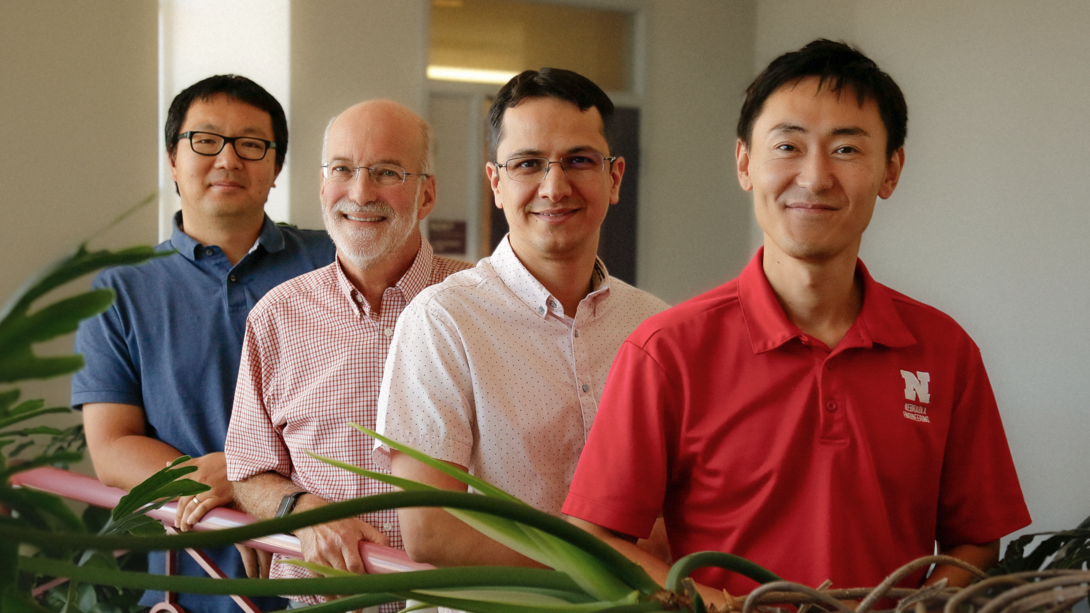
Water stress in the High Plains threatens agriculture and rural communities, and it’s expected to worsen with climate change. University of Nebraska–Lincoln researchers are joining with colleagues at two other universities to find ways to improve preservation of soil moisture in farm fields and help rural areas become more climate resilient.
The interdisciplinary team from Nebraska, Kansas State University and Langston University in Oklahoma will focus on three states where water stress is especially acute. As of October 2022, 100% of Oklahoma and Nebraska and 98.5% of Kansas were in drought. As drought conditions persist because of climate change, it’s expected farmers will have to irrigate more, and even with more irrigation, yields are expected to drop.
“In regions with irrigation, more water will be needed under the hotter and drier conditions,” said Seunghee Kim, associate professor of civil engineering and the project’s lead investigator. “Preservation of soil moisture will therefore be a critical objective under rainfed and irrigated conditions.”
The MICRA project — microbial innovations for climate-resilient agriculture — brings together engineers, mathematicians, soil and agricultural scientists, social scientists and agricultural economists to conduct research, education and outreach. It is funded by a four-year, $6 million grant from the National Science Foundation, $2.1 million of which will come to Nebraska.
Researchers will experiment with soil amendments — soil-wetting bacteria — and biochar — charcoal produced from plant matter — to measure their impact on soil water-holding capacity. The team also will combine research in soil moisture sensing, microbial communities, plants’ response to drought, irrigation technologies and socio-economic analyses.
Greenhouse, lab and field testing will occur at Kansas State and the University of Nebraska–Lincoln, while students from Langston, a historically Black university, will implement soil sensors at the sites.
“With the application of computational modeling informed by machine learning, based on the data to be generated in the project, we will have a better idea how the microbes living in the soil behave differently with this persistent drought condition and how that impacts the water retention capability of the soil,” said Rajib Saha, Richard L. and Carol S. McNeel Associate Professor of chemical and biomolecular engineering and co-principal investigator on the project.
Building climate resilience in rural America is critical, Kim said. Competition for water between rural communities and irrigators is becoming more acute. Hays and Russell, Kansas, bought ranchland with 8,000 acre-feet of water rights to an aquifer dozens of miles away and plan to transport water about 70 miles for municipal use. Their plan is under review, with court action likely.
Daniel Schachtman, George Holmes Professor of agronomy and horticulture and co-principal investigator on the project, said these cities’ experience trying to guarantee access water could be a harbinger of the future elsewhere.
That’s where the perspective of economists and social scientists becomes crucial.
“If we can slow down depletion of the aquifer, that has important economic implications,” said Taro Mieno, associate professor of agricultural economics.
In four years, researchers hope to “have a much better understanding of the types of microbes and the types of biochar materials that can help make better use of water in agriculture production and also better use of nutrients,” said irrigation engineer Saleh Taghvaeian, associate professor of biological systems engineering.
Taghvaeian said researchers hope to have a clear cost-benefit analysis of the strategies and to be able to convey those findings to farmers who ultimately must be convinced to implement solutions in their fields. The project will include surveys and focus groups regarding irrigators’ perceptions about novel technologies.
Nine graduate and 13 undergraduate students are expected to be on the MICRA team with 15 faculty from the three institutions. Rajib Saha, associate professor of chemical and biomolecular engineering, also serves as co-principal investigator.







